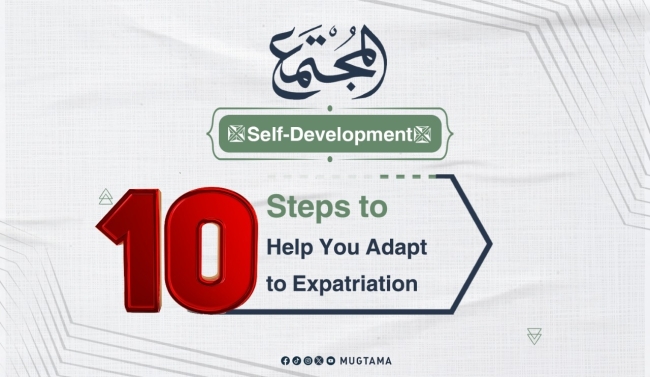One may experience traveling abroad and living in a different community, especially with the increasing rates of global migration, which currently stand at approximately 281 million migrants, according to the International Organization for Migration's migration report. This situation imposes challenges on expatriates and their families due to the differences in customs and traditions between societies.
These challenges, particularly for children, include linguistic, cultural, religious, social, economic, and political difficulties. Such challenges are more pronounced when migration involves transitioning from an Arab society to a European or Western one, where differences in language and religion are significant. However, the experience may be easier when the expatriate resides in an Arab country that shares similar customs, traditions, language, and religion.
Psychologists and sociologists note that expatriates often experience feelings of isolation, and failure to adapt quickly to the new society can lead to depression. To overcome these challenges, expatriates are advised to form new friendships, engage in productive activities, strengthen their connection with Allah, and associate with pious individuals. This serves as a firm bond that helps them cope with their situation.
However, the situation becomes more complicated when expatriation is prolonged and occurs in a non-Muslim country. Here, expatriates face a struggle between integrating into the new society and maintaining their identity, especially amid increasing temptations and distractions in the host country. This issue is exacerbated for second and third-generation immigrants, who may lose their connection to their homeland and native language altogether.
The following strategies offer expatriates practical ways to adapt to life abroad, turn negative emotions into positive ones, and emerge from the expatriation experience as winners, provided they adhere to these guidelines:
1. Strengthen Connection with Mosques
Frequent visits to mosques or Islamic centers in non-Arab countries are essential. Engage in acts of worship, remembrance, and maintaining congregational prayers. Allah says: "Those who have believed and whose hearts are assured by the remembrance of Allah. Unquestionably, by the remembrance of Allah hearts are assured." (Surah Ar-Ra'd: 28).
2. Build a Social Network
Seek out Muslim families in the area, fostering relationships that reduce feelings of isolation and facilitate integration into the new society. Encourage family members to interact with families who share similar values, customs, language, and religion.
3. Prioritize Family Bonding
Strengthen familial ties by eating meals together, speaking the native language at home, and avoiding leniency in preserving cultural identity within the household. This helps prevent children from losing their identity or experiencing cultural and value disintegration.
4. Celebrate Religious Occasions
Commemorate Islamic events like the Hijra, the Prophet’s birth, Isra and Mi’raj, Ramadan, and the two Eids. These traditions nurture a strong connection between expatriates and their religion, identity, and homeland.
5. Reinforce Identity
Encourage children to watch historical and cultural documentaries that enhance their sense of belonging to their homeland. Emphasize that expatriation is a temporary phase, reinforcing their eventual return to their country.
6. Form Local Friendships
Build relationships with virtuous locals in the host country. Gradually integrate into the society while respecting cultural differences and adhering to Islamic principles and values.
7. Learn the Local Language
Ensure that both parents and children master the language of the host country to facilitate daily interactions while maintaining the use of the native language at home.
8. Understand Local Laws
Familiarize yourself with the laws and customs of the host country to avoid unintentional violations that may lead to unnecessary complications. Seek guidance from experienced expatriates to navigate the new society effectively.
9. Maintain Ties with Relatives
Among the etiquettes of an expatriate is to maintain ties with their family. As stated in the sacred hadith, the Prophet (peace and blessings be upon him) said: "I am Allah, and I am Ar-Rahman. I created the Rahim(womb), and named it after My Name. So whoever keeps good relations with it, I keep good relation with him, and whoever severs it, I am finished with him" (Al-Tirmidhi, Abu Dawood, and Ahmad). In another prophetic hadith: "He who believes in Allah and the Last Day, let him maintain good the ties of blood relationship" (Sahih al-Bukhari). The Prophet (peace be upon him) also said: "Whoever loves that he be granted more wealth and that his lease of life be prolonged then he should keep good relations with his Kith and kin" (Sahih al-Bukhari).
An expatriate should regularly communicate with their family, checking on them through audio or video calls. With the rapid advancement of communication technologies, it has become easier to stay updated on the affairs of relatives at all times. Additionally, it is essential to maintain annual visits, avoiding estrangement, harshness, or prolonged absence. Such neglect can harden the expatriate's heart, causing them to forget their homeland, sever ties with their family, and risk losing their identity and faith.
10. Engage in Da'wah
Wherever expatriates find themselves, they should strive to invite others to Islam. This commitment strengthens their faith and maintains their connection to their religion. The Prophet Muhammad (ﷺ) said to Ali (RA): "By Allah, if one man is guided on the right path (i.e. converted to Islam) through you, it would be better for you than (a great number of) red camels." (Sahih al-Bukhari). Let expatriates take inspiration from Mus'ab ibn Umair (RA), who served as Islam’s first ambassador, spreading the faith in Madinah and earning great success during his time abroad.
-------------------------------------------------------------


